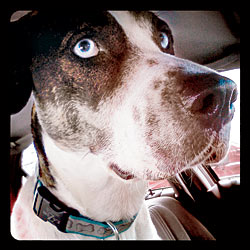
In 1978, the neighbors’ perpetually indignant German shepherd ended a game of hide-and-seek in his yard when he sank his incisors into my ass. But Major did not turn me into an animal hater. He turned me into an animal ignorer. As a pragmatic six-year-old, I understood that the only way I could coexist with dogs, cats, and other nonhumans was to let them live their own lives and kindly show me the same courtesy. I was happy with this arrangement; so were they.
Then I married an animal lover, and we quickly spawned two more. The puppy-related entreaties began early and pinnacled last summer, when my wife heard about a prison program called Mixed Up Mutts, in which inmates train troubled dogs that are then placed with families. Before I could protest, I was standing at the Westville Correctional Facility in northwestern Indiana, choosing from three dogs, none of which I wanted. The least offensive was Easy, a goofy 45-pound Australian shepherd mix with intense blue eyes. “She’s been sleeping in my bed with me,” said the inmate who had trained her. Twenty minutes later, as the guy returned to his concrete cell alone, I drove off with my family, and I took his best friend. That’s some serious guilt voodoo right there.
Things got worse. Easy, it turned out, did not live up to her name. For starters, she didn’t satisfy any of my three prerequisites (no shedding, licking, or barking) and promptly launched her primary mission, which involved leaving hair and/or drool on everything I owned and yapping at the elliptical machine. My home was no longer mine. But the problem was not the dog herself, a cheerful oaf who bonded with my small children and even warmed to me, oblivious to my resentment. I was being asked to wipe clean a lifetime of indifference toward the entire animal kingdom. And every time my son hugged the dog a little tighter, the thought crescendoed: I have made a huge mistake.
Thus began a petty, relentless campaign to prove the logistics of pet ownership were too complicated for my family. When I had to walk the dog instead of spending time with the kids, I broadcast my displeasure to all parties. I screamed at Easy for digging through the garbage and reprimanded her for the tick that I tweezed from her neck. When she peed in the dryer, I made my feelings known. For five months, I blamed the dog for basically acting like a dog.
Finally my wife threw up her hands and said that my anger had become unbearable. But if I wanted Easy out, I would have to be the one to call PAWS and take the dog away. And the one to explain to our children why their “sister” was headed to a storefront across town. No problem, I said. Anything to get our lives back. But I had disappointed my wife, and though she never blamed me, the realization hit hard. I was about to sell out my family’s happiness for my own. It may be the deepest shame I’ve ever felt as a man, and when the time came to place the call, I surprised myself by bursting into tears. “I can’t do it,” I told my wife. Then I promised: no more bitching about—or at—the dog.
This story doesn’t end with a selfish heart melted by an animal’s unconditional love. I am a flawed man struggling daily against my instincts—and still don’t understand how the rest of my family could automatically enfold this irrational slob into our unit. The other night, my wife kicked Easy out of our bed, where she never should have been to begin with. Ten minutes later, the dog hopped back up on the comforter, peed, and took off running. I wasn’t happy. But now I accept the episode as part of our lives, mostly so I can have the pleasure of watching my children grow into something I never will be.


